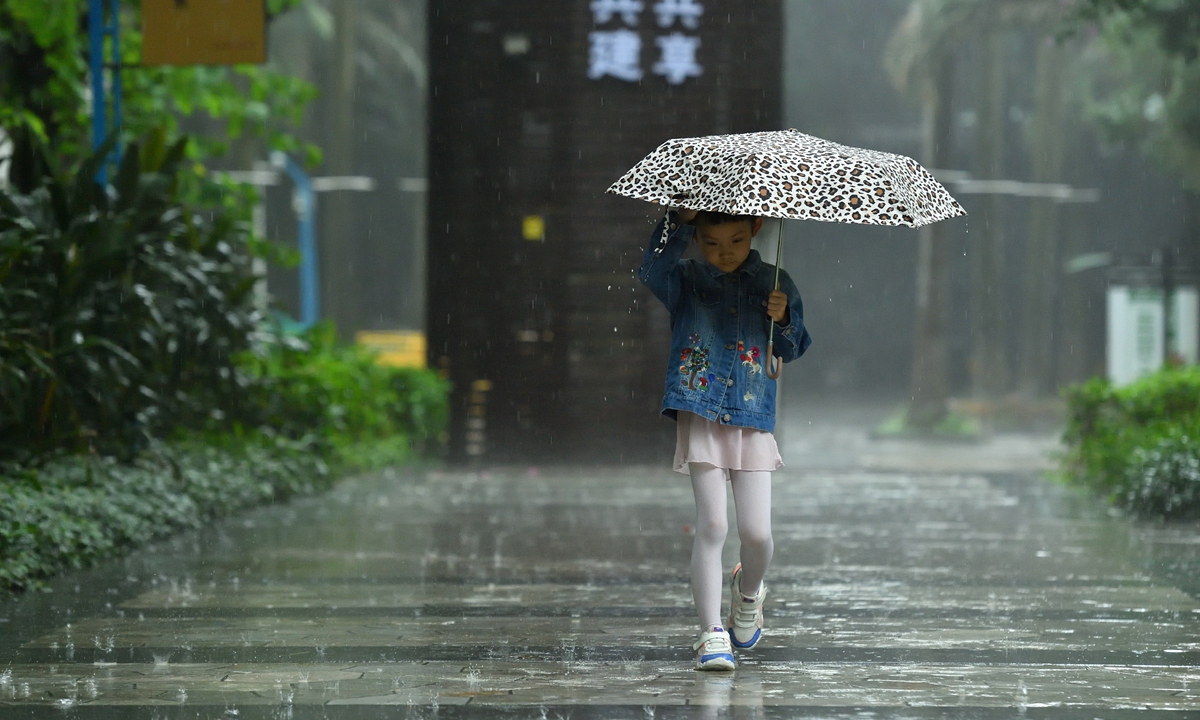Suspending schools and public transport… Guangdong in full swing for ‘strongest’ rainstorm this year

A girl walks on the street of South China's Guangzhou on May 11, 2022. The rainfall gradually increased in the evening. Photo: VCG
Major cities in South China's Guangdong Province including Guangzhou and Zhuhai have announced plans to suspend primary and middle schools, as well as public transport, ahead of the "strongest rainstorms" in 2022, which will bring risks of flash floods and geological disasters, as well as a painful memory of the record downpour in Zhengzhou last year.
Experts expressed confidence that with a more mature emergency response mechanism and early preparations, Guangdong is unlikely to repeat this tragedy.
Weather forecasters in Guangdong said the province is expected to have persistent heavy rain from Tuesday to Friday. The rain could be the strongest, most extensive and longest-lasting this year, and it may even break daily records in some parts of the region, said authorities.
Over 50 rainstorm warnings had been issued in Guangdong as of press time, including 11 red alerts. Nearly half of the cities and counties in the province are enveloped in "the strongest downpours," which show no signs of weakening.
The heavy rainfall in Guangdong has had an uneven distribution, and some places are seeing extreme downpours, with Zhuhai, Zhongshan and three other cities recording torrential rains, the Guangdong Provincial Meteorological Bureau said on Wednesday.
The state flood-control department upgraded warning levels from IV to III in Guangdong as well as the neighboring Guangxi Zhuang Autonomous Region on Wednesday, while dispatching expert teams to help locals respond to potential floods.
To minimize the impact on people's lives, Guangzhou and Zhuhai, two major Guangdong cities ordered all primary and middle schools to suspend classes, and advised residents to work from home and refrain from going outside unless necessary. Public bus and subway lines affected by the floods were suspended.
Guangzhou also advised residents to buy food and life necessities sufficient for two days in preparation.
Fully notified and prepared, many Guangzhou residents joked that they had made such thorough preparations that they were rather excited about the rain than scared, expressing faith in the government's quick response to potential risks.
As for why Guangzhou's rainfall was "delayed," authorities explained that it could be attributed to the challenges of rainfall distribution forecasts, which are made based on a monsoon outbreak. But they noted that current weather conditions are still "very conducive" to heavy rains.
"China's monsoons are normally from the Pacific Ocean, bringing a large amount of water vapor. When the hot and humid air meets the cold air coming from the north of the country, it will form heavy rains. South China's Guangdong and Guangxi are the entrances of such monsoons, therefore the rainfall will be relatively large in scale and quantity," Wang Gengchen, a research fellow at the Institute of Atmospheric Physics of the Chinese Academy of Sciences, told the Global Times on Wednesday.
Wang noted that normally China encounters such extreme weather in June and July, but this year it has come in May. The reason was that the cold front in northern parts of the country stayed longer and stronger than in previous years, pushing over to southern China where it met the monsoon.
Other provincial-level regions in South or Southwest China like Guangxi, Yunnan and Guizhou have been washed by downpours. According to data released by Guangxi's city of Guilin, a famous tourist city known for heart-melting landscapes, the floods have so far affected some 6,418 people.
However, Wang believed that as the south has accumulated rich experience in coping with such extreme weather, and emergency response mechanisms are relatively mature there, it is unlikely that the rain would cause great damage like what Zhengzhou in Central China's Henan Province experienced last July.
Unprecedented rain hit Zhengzhou, triggering record floods that caused severe damage to people's lives and property. Nearly 15 million people were affected, and 398 went missing or died in Henan, causing direct economic losses of 120 billion yuan ($17.8 billion).

